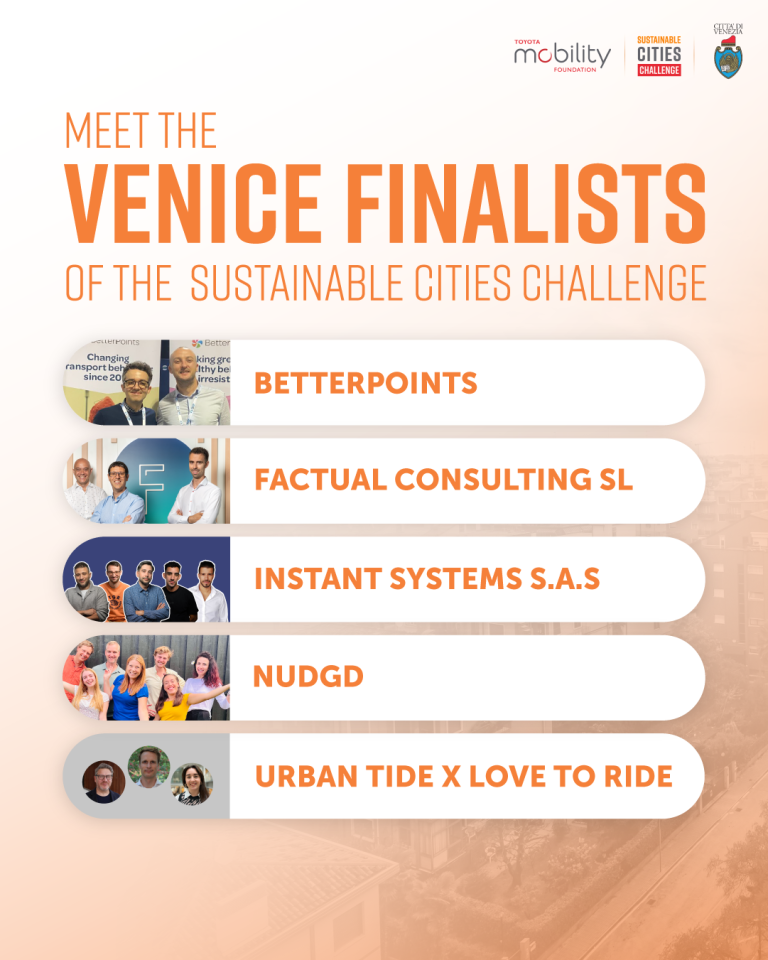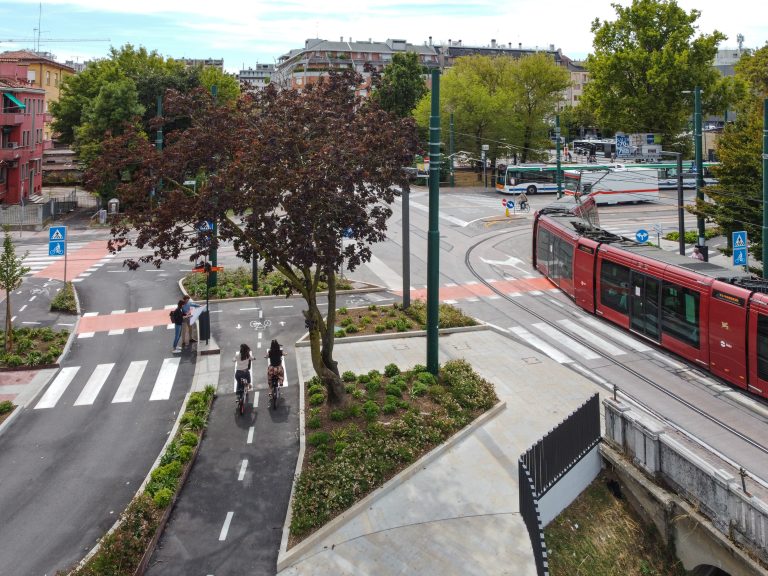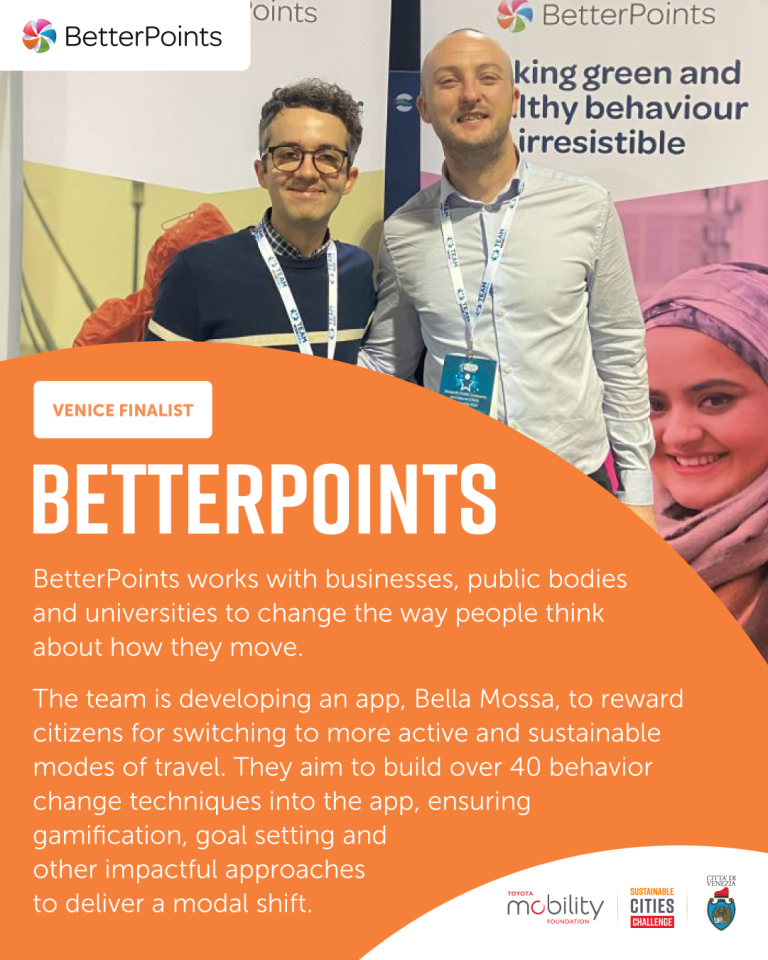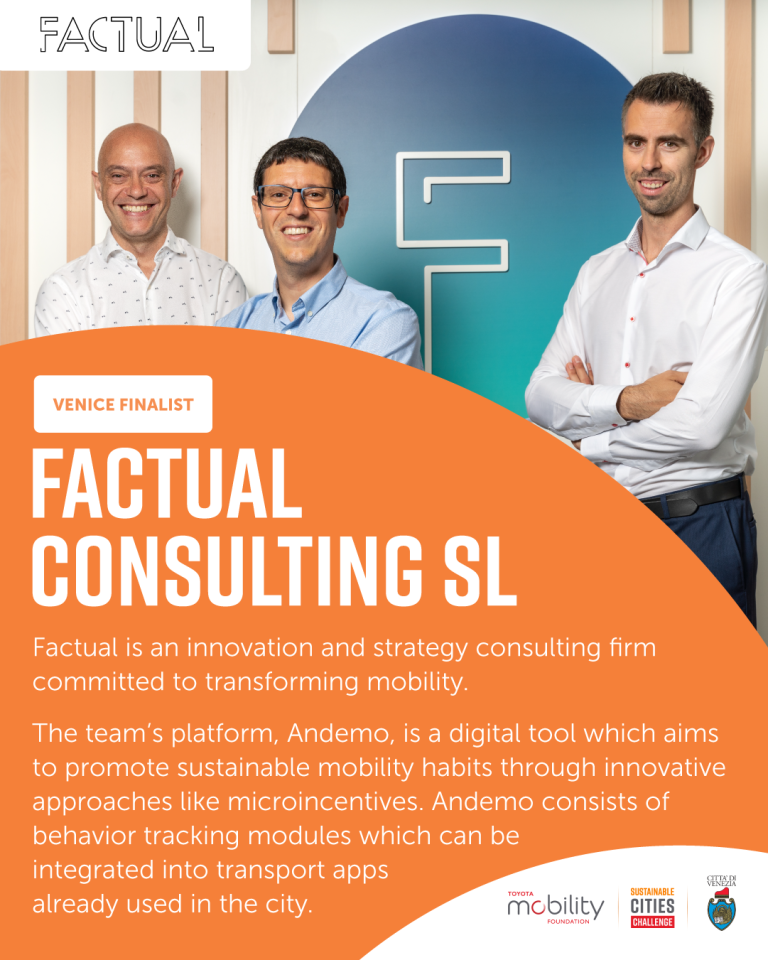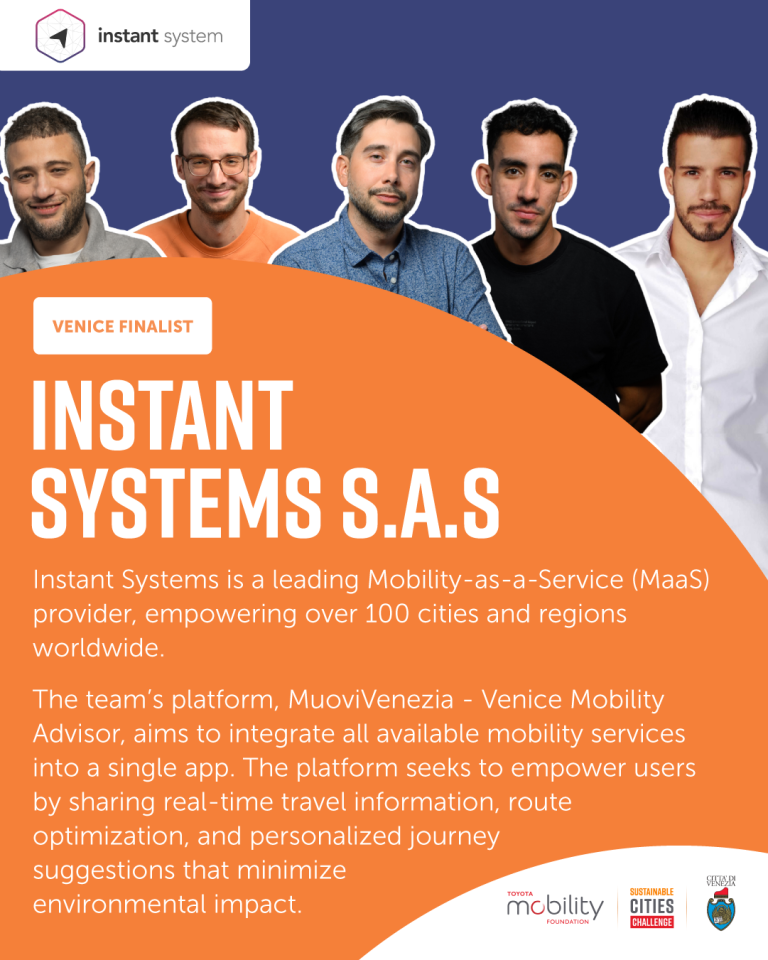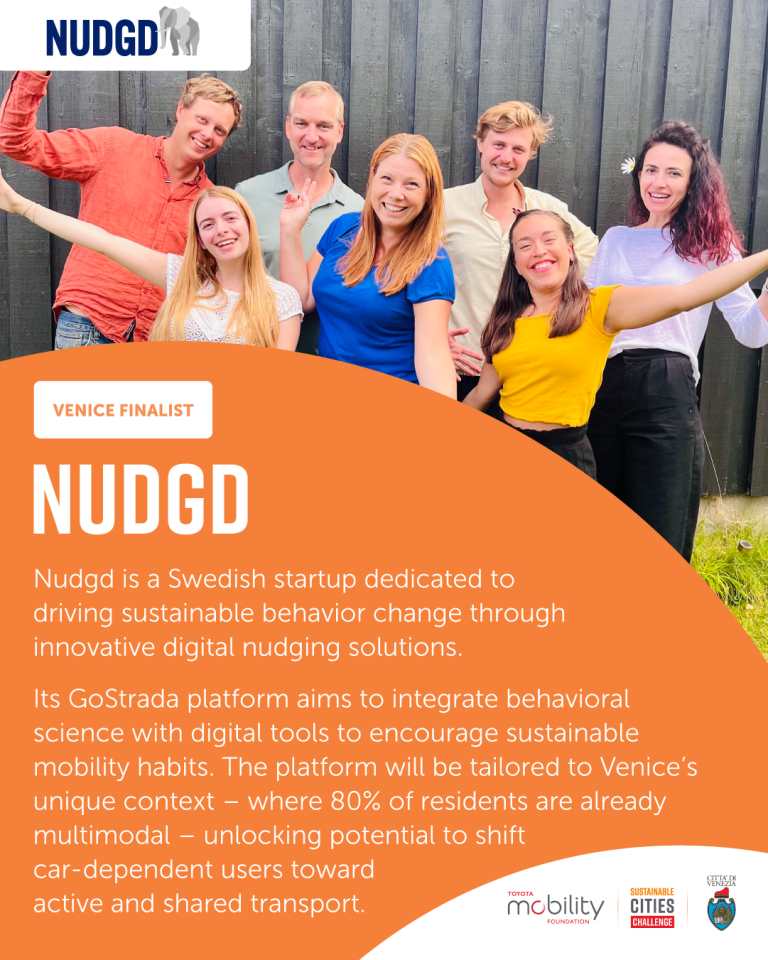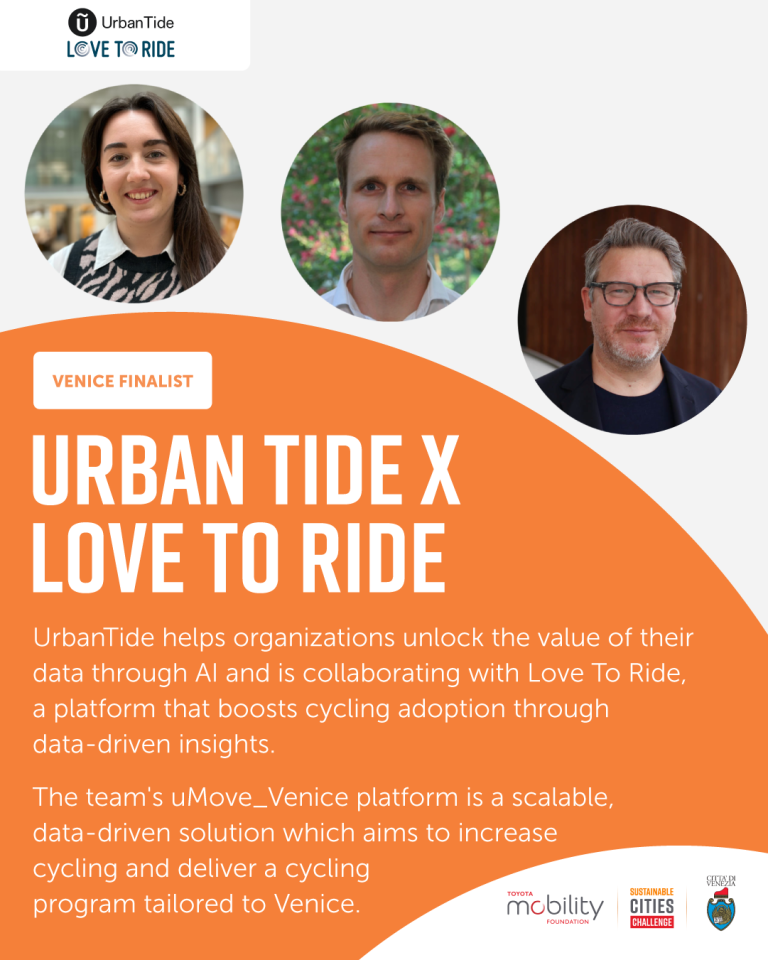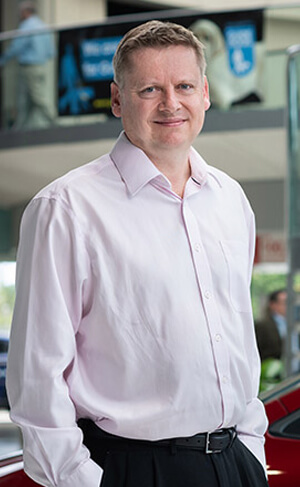Toyota Mobility Foundation announces five finalists for Venice Sustainable Cities Challenge
● Five finalists have been selected for the £2.2 million ($3 million) Venice Sustainable Cities Challenge, including Surrey-based BetterPoints Limited
● The finalists were chosen for their new ideas to encourage use of low and zero-carbon transport
● Each will be awarded more than £95,000 ($130,000) funding to demonstrate their innovations for the city of Venice
The Toyota Mobility Foundation has announced the five finalists selected to advance in the Sustainable Cities Challenge in Venice. They were chosen by a panel of expert judges following rigorous evaluation of their ideas for encouraging the use of existing low and zero-carbon transport in the Italian city.
Developed in collaboration with the City of Venice, Challenge Works, and World Resources Institute, the two-stage, three-year £6.6 million ($9 million) global TMF Sustainable Cities Challenge received more than 120 entries from across the world to promote the use of public transport and different mobility options across Venice’s mainland area.
Ten semi-finalists went forward to adapt and refine their concepts over a six-month period; five then advanced to the finals stage. Selection was based on a range of criteria, including innovation, impact, usability, viability, and team capacity. Judges looked for solutions that not only inspire people to change their behaviour towards sustainable transport, but also demonstrate a deep understanding of local context, user needs and implementation feasibility. Each team was required to present a demonstration plan with measurable performance indicators to ensure long-term impact and scalability.
The judging panel, comprised of urban mobility experts and city stakeholders, selected the following finalists:
● BetterPoints Ltd – Surrey-based BetterPoints works with businesses, public bodies and universities to change the way people think about how they move. The team is developing an app to reward citizens for switching to more active and sustainable modes of travel. It aims to build more than 40 behaviour change techniques into the app, to include gamification, goal setting and other functions that can make an impact.
● Factual Consulting SL – Factual is a strategy consulting firm based in Spain, committed to transforming mobility. The team’s platform is a digital tool to promote sustainable mobility habits through innovative approaches such as micro incentives. It consists of behaviour tracking modules which can be integrated into transport apps already used in the city.
● Instant System S.A.S – Instant Systems is a leading Swedish Mobility-as-a-Service (MaaS) provider, empowering more than 100 cities and regions worldwide. The team’s platform is designed to integrate all available mobility services into a single app. The platform seeks to empower users by sharing real-time travel information, route optimisation and personalised journey suggestions that minimise environmental impact.
● Nudgd AB – Nudgd is a Swedish startup dedicated to driving sustainable behaviour change through new digital nudging solutions. Its platform integrates behavioural science with digital tools to encourage sustainable mobility habits. The platform will be tailored to Venice’s unique context – where 80 per cent of residents are already use multiple modes of transport – unlocking potential to shift car-dependent users toward active and shared transport.
● UrbanTide Limited x Love to Ride – Love to Ride Venice is a scalable, data-driven solution combining UrbanTide’s smart mobility insights delivered through Love to Ride’s proven behaviour change platform. The aim is to make cycling more visible, motivating and accessible through targeted campaigns, real-time analytics and community engagement. It is designed to help Venetians shift everyday travel habits, track progress and build a self-sustaining cycling culture with lasting, measurable impact
“At Toyota Mobility Foundation, we believe the future of urban mobility lies in inclusive, human-centered solutions that are both sustainable and scalable,” said Monica Perez Lobo, Director, Toyota Mobility Foundation Europe. “These finalists represent the kind of forward-thinking innovation that can transform cities such as Venice — enhancing access, reducing emissions and improving quality of life. Through this Challenge, we’re not just supporting new ideas; we’re helping to shape a mobility landscape for greener and more livable cities.”
Kathy Nothstine, Director of Cities and Societies at Challenge Works, commented: “Reaching this finalist stage marks an important step that supports Venice’s journey towards sustainable mobility. It’s not just about deploying smart tools; success lies in how deeply these solutions resonate with people’s everyday needs and choices. This challenge creates an opportunity to test those insights in a real urban environment and drive meaningful change.”
Ben Welle, Director of Integrated Transport and Innovation at WRI Ross Center for Sustainable Cities, added: “The selection of these five teams aligns with an exciting chapter in Venice’s journey of innovation in the field of mobility. These ideas are designed not just to work here, but to inspire solutions globally. The innovations we see emerging will benefit local communities and offer lessons for cities around the world working to enhance sustainable urban mobility.”
The teams will now receive $130,000 (about £96,000) implementation funding to proceed to the finalist stage, where they will further develop and test their solutions within the city.
The Sustainable Cities Challenge is funded by the Toyota Mobility Foundation and has been designed in partnership with Challenge Works and the World Resources Institute. It aims to create cleaner, more efficient urban mobility systems worldwide. Venice’s finalist solutions exemplify the creativity and commitment needed to address global sustainable challenges through local action.
For more information, visit sustainablecitieschallenge.org.
ENDS
Notes to Editors:
About the Sustainable Cities Challenge
The Sustainable City Challenge is a two-stage, three-year £6.6 million ($9 million) global opportunity for cities and innovators. The Sustainable Cities Challenge will be delivered over two stages:
● Stage 1: Call to cities
The Challenge sought cities who wish to host City Challenges in 2024 – 2025. In November 2023, 10 shortlisted cities received a range of capacity building support to help them understand the issue they want to solve and attract innovators to provide solutions. This included participation in a capacity building academy in Dallas, Texas from 13-15 November 2023. By May 2024, three cities were selected to host City Challenges to find solutions for local mobility challenges: Detroit (USA), Varanasi (India), and Venice (Italy).
● Stage 2: Call to Innovators via three City Challenges
Working with the host cities, the Sustainable Cities Challenge team supported by designing local City Challenges which launched between May and June 2024. Each City Challenge offers up to £2.2 million ($3 million) in implementation funding to innovators. Host Cities held open calls for entries from innovators via their City Challenge, with the support of the Sustainable Cities Challenge team. Together, they selected their finalists to test their solutions from 2024–2025. In 2026, final implementation funding will be given to winners in each host city to continue to implement and grow their solutions.
Timeline of the TMF Sustainable Cities Challenge
• Detroit Challenge: Transforming Height
• Varanasi Challenge: Innovating Crowd Flow
• Venice Challenge: Embracing Sustainable Mobility
About Toyota Mobility Foundation
The Toyota Mobility Foundation (TMF) was established in August 2014 by the Toyota Motor Corporation (Toyota) to support the development of a more mobile society in which everyone can move freely. The Foundation underscores Toyota’s ongoing commitment to continuous improvement and respect for people. It utilises Toyota’s expertise and technologies to support strong mobility systems while eliminating disparities in mobility. TMF works in partnership with universities, governments, non-profits, research institutions and other organizations, creating programs that are aligned with the UN Sustainable Development Goals (SDGs) to address mobility issues around the world.

